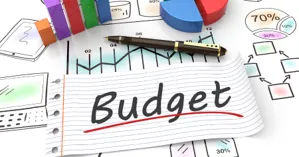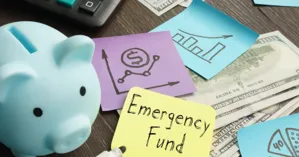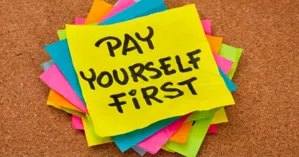- Quick Summary
- Identify Short and Long-Term Goals
- Build a Budget and Stick to It
- Pay with Cash
- Start an Emergency Fund
- Save for Retirement Planning
- Automate Your Savings
- Pay Yourself First
- Use Separate Accounts for Different Goals
- Learn About Investing
- Keep an Eye on Your Tax Planning
- Have the Proper Insurance
- Take Care of Your Health
- Find a Qualified Financial Advisor
- Conclusion

- Quick Summary
- Identify Short and Long-Term Goals
- Build a Budget and Stick to It
- Pay with Cash
- Start an Emergency Fund
- Save for Retirement Planning
- Automate Your Savings
- Pay Yourself First
- Use Separate Accounts for Different Goals
- Learn About Investing
- Keep an Eye on Your Tax Planning
- Have the Proper Insurance
- Take Care of Your Health
- Find a Qualified Financial Advisor
- Conclusion
When you’re young, regardless of whether you’re making a lot of money or not, you should take the time to learn a few financial rules. Understanding various aspects of your financial life is crucial for building a healthy financial future. Before diving into the tips, it's important to assess your financial situation to tailor the advice to your individual needs. We think this is so important that we went to the experts. Here are 14 tips from financial planners for millennials.
1. Identify Short and Long-Term Goals

When you get in the car, you don’t just drive; you have a destination in mind. Your finances are the same way. You must have goals. And although this may be overwhelming, it’s important to sit down and write down what they are. For example, saving for retirement could be a long-term goal, while saving for a house might be another. Learning to invest might be a short-term goal. You can’t make a financial plan if you don’t first map out your goals, as mapping out goals is a crucial step in the financial planning process.
2. Build a Budget and Stick to It

Nobody wants to hear the word “budget” in the context of personal finance. But it’s vital to know what income is coming in and what money is going out every month. By creating a budget, you can dig deep into your expenses and see what can be cut. That will help you with your savings goals and paying down credit cards.
3. Pay with Cash

Managing financial accounts effectively involves using cash over credit. Instead of reaching for that credit card, grab your debit card. If you don’t have money in the bank, then don’t spend it. Using a credit card is like using invisible money. You don’t really think about it until the first of the month when the bill comes. Then that’s all you can think about.
4. Start an Emergency Fund

You think you're invincible and nothing bad can happen. But what if you lose your job or become ill? Nobody thought there would ever be a pandemic, but it came, and a lot of people lost their jobs. It's imperative you have an emergency fund. Go back to your budget and add up your monthly expenses. Then, put away six months of your monthly expenses. That way, if the unthinkable happens again, you're prepared.
5. Save for Retirement Planning

If your company has a 401(k) plan, enrolling in it is a crucial part of retirement planning. If they’re matching it, ensure you put enough money away to take advantage of it. Think of it as free money. If your company doesn’t have a 401(k), start putting money in an IRA. Just $50 a month will equal hundreds of thousands by the time you retire.
6. Automate Your Savings

Ask your employer if they’ll deposit part of your paycheck into a high-yield savings or investment account. If they won’t, there are apps, like Acorns and others, that you can connect with your bank accounts to help you save.
7. Pay Yourself First

When you are paid, before you do anything, set aside money for your future self. This comes before paying bills or buying that morning cup of coffee. Work it into your budget. But remember, you work hard, and your future self should benefit from that.
8. Use Separate Accounts for Different Goals

Have different accounts for all your goals. For example, don’t save your emergency fund with your checking account. The temptation will be too great to spend it. Instead, deposit your emergency fund in a high-yield savings account. Many online banks have high-yield accounts. If you’re saving for a vacation, do the same. Set an account up just for your vacation. You’re more apt to save if you do this. Separating accounts can also help in managing a diversified investment portfolio effectively.
9. Learn About Investing

There’s a difference between saving and investing. Learning about investing involves seeking proper investment advice. It is also important to understand different investment strategies to align them with your financial goals. Savings involves setting money aside, while investing is about creating wealth. Savings are more risk-free, but the interest they earn may not keep up with inflation. Investing is more high-risk, but it has greater long-term rewards. When choosing between the two, analyze your financial goals, risk tolerance or time before retirement.
10. Keep an Eye on Your Tax Planning

When you’re offered a job, use an online after-tax calculator to determine what your net (earnings after taxes) is. It will consider everything that comes out of your paycheck before you receive it. That includes FICA taxes, Social Security, state taxes, insurance premiums, etc. You’ll find your new salary is a lot lower than you expected. The same goes if you receive a raise. This is where your 401(k) becomes important because it’s pre-taxed income; it will lower your tax burden and can be a crucial part of a broader tax planning strategy.
11. Have the Proper Insurance

Ensure that you have renter's insurance if you rent. If you were robbed or your apartment caught on fire, how would you replace your belongings? You would have to go without. If your work doesn't provide it, purchase a disability insurance policy. If you were to become incapacitated, the disability insurance would kick in and make up for some of the income. You won't be totally without a salary. Insurance indirectly guards your wealth.
12. Take Care of Your Health

If you don't have health insurance through your company or you are self-employed, purchase a policy. The Health Insurance Marketplace is a federal plan that can help you find an affordable policy If you have insurance through work, check and see if they have a Health Savings Account (HSA) An HSA can be used to supplement your health insurance if the insurance has a high deductible. Health Savings Accounts are also pre-taxed, so it helps you with your taxes
13. Find a Qualified Financial Advisor

Don’t go it alone, find a qualified financial advisor. Ask friends and family if they have a recommendation. Do some research and read reviews. If you’re still not sure, meet with them to see if their philosophy aligns with your goals. Remember, not all financial advisors serve the same client base, so it's important to find one whose expertise matches your specific needs and life stage.
Conclusion
It’s not hard, but it mostly requires some planning and organization. Working with a financial planner can help in establishing your goals and formulating a budget. Once you have the framework set, fill it in with everything else.





